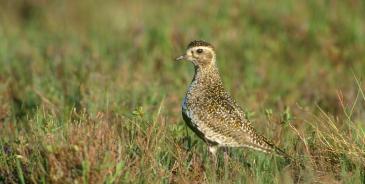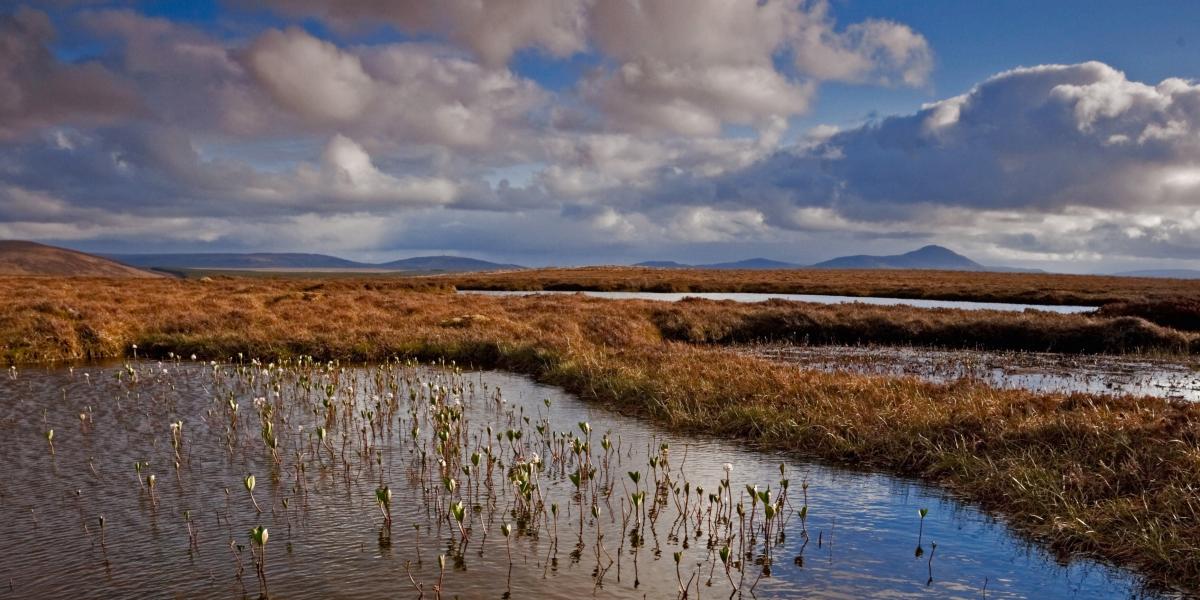In 2020 The Flow Country took an enormous step towards becoming the world’s first peatland world heritage site by passing stage one of the nomination process!
In late 2019, The Peatlands Partnership submitted a technical evaluation of The Flow Country to an expert panel assembled by the UK Government. After a nervous few months waiting, we were delighted when the panel recommended that The Flow Country proceed to the next stage of the world heritage site process.
There is a lot of work ahead of us, but if The Flow Country is successful it will join the likes of The Grand Canyon and The Great Barrier Reef on a very exclusive list of world-renowned natural sites.
We firmly believe that The Flow Country belongs on the world heritage site list and that securing this highest of accolades could bring many benefits to local communities and to peatlands worldwide.
Why does the Flow Country deserve World Heritage status?
The proposed Flow Country World Heritage Site straddles Caithness and Sutherland, lying at the heart of one of the largest areas of blanket bog anywhere in the world. This globally rare habitat includes a wide range of peatland vegetation, bog pools and a selection of rare and endangered bird and insect species.
It is the quality and extent of the blanket bog habitat that gives The Flow Country its outstanding universal value and could justify its place on the world heritage site list. In making this argument to UNESCO, we are saying that The Flow Country is the best example of this type of habitat anywhere in the world.

In addition to being a stronghold for a globally-rare type of peatland, The Flow Country also offers vital local ecosystem services. As you may have read elsewhere on this website, The Flow Country stores a remarkable amount of carbon and will continue to do so if kept in healthy condition. The peatlands also act as a natural filtration system for the rivers and streams that run off and through it, providing cleaner waters for aquatic wildlife and people. The Flow Country is also a place of work and leisure for locals and visitors to the far north.
What could a Flow Country World Heritage Site bring to Caithness and Sutherland?
A recurrent theme in world heritage is that you receive those benefits which you prepare for. Some world heritage sites take advantage of the prestige of the accolade to attract heritage or eco tourists to stay and spend in the region for longer, while other sites might be more interested in the educational or social benefits.
We were interested to find out what benefits the people of Caithness and Sutherland wanted to see from a Flow Country World Heritage Site and embarked on a wide-reaching community consultation from 2018-2019. Through a combination of all-day drop-in sessions, community council meetings, landowner visits, local and national media coverage and word of mouth we were delighted to receive a high level of support for the world heritage site project.
From our local engagement activities, the most common hopes for the region were an increase in sustainable tourism, funding for community projects, environmental protection, the reversal of social issues such as depopulation and lack of job opportunities. The most commonly cited concerns were over-tourism and restrictions on land use.
It is so important that local views are incorporated into the project and we will continue with more community consultation in the coming months.
We also felt it was important to reach out to the whole of Scotland, as claiming the world’s first peatland world heritage site would be a national honour. With this in mind, we put together a talk series featuring BBC presenters Neil Oliver and Professor Iain Stewart and Bath City World Heritage Site Chairman Professor Barry Gilbertson which visited Thurso, Lairg and Inverness in July 2019. The talks attracted 842 attendees in total, while publicity for the events and our project reached an estimated 4 million people. In addition to this, we also secured a presentation space at Edinburgh Botanic Gardens during the Edinburgh Fringe festival to share our project with an international audience.
What happens next?
After passing the Technical Evaluation stage in early 2020, the next step is to submit a full nomination package to UNESCO. We will put together a strong argument for why The Flow Country should be a world heritage site, as well as a draft management plan for the area and a defined boundary for the site. This will be submitted to UNESCO in late 2022, with a decision being made by mid 2024.
Have Your Say
Community consultation and input is key in shaping this bid, and what can be achieved through World Heritage inscription. Information on previous consultation events is outlined below, and the next period of consultation is just about to open (May 2022) with 16 drop in events being held throughout the region. Alongside these face to face events an online portal will be available to provide feedback on both the proposed boundary and the wider project. More information on the upcoming events can be found here.
As always, we would be delighted to hear from you at any stage of this process. Contact details can be found at the bottom of this page.
Who are we?
The Technical Evaluation will be submitted by The Peatlands Partnership (now the Flow Country Partnership), which was formed in 2006 and is made up of the following organisations: NatureScot, Forestry and Land Scotland, The Highland Council, RSPB Scotland, Plantlife International, the Environmental Research Institute (University of the Highlands and Islands), Highland Third Sector Interface, the Flow Country Rivers Trust, Northern Deer Management Group and Highlands and Islands Enterprise (HIE).
In 2017 The Peatlands Partnership established the Flow Country World Heritage Site Working Group. This Working Group was tasked with carrying out an extensive community consultation and completing the technical evaluation of The Flow Country as a potential World Heritage Site. The Flow Country World Heritage Site Working Group consists of: NatureScot, Forestry and Land Scotland, The Highland Council, RSPB Scotland, The Environmental Research Institute, The Confederation of Forest Industries, HIE, The Federation of Small Businesses, Scottish Land and Estates, Rural Payments and Inspections Division, Wildland ltd. and Visit Scotland.
Contact us
We would love to hear your thoughts and questions, so please feel free to contact us using the details below:
steven.andrews@highland.gov.uk (Flow Country World Heritage Site Coordinator, The Highland Council)
joe.perry@highland.gov.uk (Climate Change Coordinator, The Highland Council)


